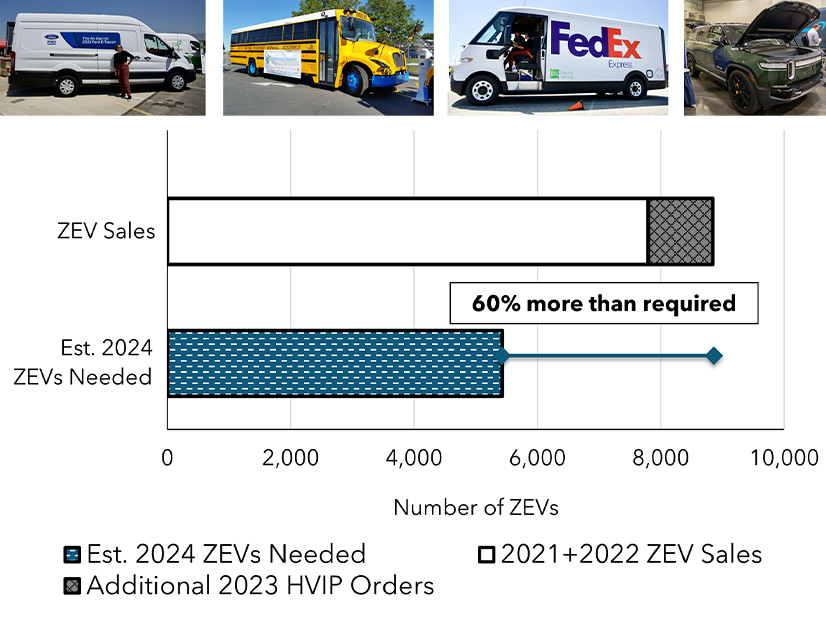
Truck manufacturers have been racking up zero-emission vehicle credits in advance of California’s Advanced Clean Trucks rule taking effect with model year 2024, a new report shows.
Truck manufacturers have been racking up zero-emission vehicle credits in advance of California’s Advanced Clean Trucks (ACT) rule taking effect with model year 2024, a new report shows.
About 7,900 zero-emission trucks from model years 2021 and 2022 have been sold in California, according to a report from the California Air Resources Board (CARB). Another 1,000 ZEV trucks are expected to be sold from those model years based on participation in the Hybrid and Zero-Emission Truck and Bus Voucher Incentive Project.
The combined total is about 60% more than the 5,500 zero-emission trucks that CARB expects manufacturers to need to meet the model year 2024 quota. And that doesn’t include zero-emission truck sales from model year 2023.
“Helping the businesses that rely on trucks to transport goods across the state switch to zero emissions is key to achieving a clean air future, and the data show that progress is well underway,” CARB Executive Officer Steven Cliff said in a statement.
Cliff said the figures indicate trucking businesses are interested in zero-emission vehicles, and manufacturers are stepping up to meet the demand.
Rivian led the way in model year 2022, with 5,286 zero-emission trucks sold in California. Ford followed with 1,686 ZEV trucks sold — out of a total of 28,606 medium- and heavy-duty vehicles delivered for sale in the state.
GM delivered 24,500 trucks for sale in model year 2022, but none of them were zero-emission, according to CARB.
In the Class 7-8 tractor category, Volvo sold 64 zero-emission vehicles from model year 2022. Paccar sold 16, followed by Daimler and Nikola Motor, with 13 each.
For model year 2022, 104,558 medium- and heavy-duty trucks were delivered for sale in California, including 7,639 zero-emission trucks, or 7.3%.
Advanced Clean Trucks, which CARB adopted in 2020, requires truck manufacturers to sell an increasing percentage of zero-emission vehicles in California starting in 2024.
The sales requirement varies based on the weight class of the truck. For model year 2024, ZEVs must account for 5% of Class 2b-3 trucks; 9% of Class 4-8 trucks; and 5% of Class 7-8 tractors. CARB said that on average, about 6% of trucks sold will need to be ZEVs in model year 2024.
Truck manufacturers may earn early credits for ZEV sales in model years 2021 through 2023, to be banked for use in later years or sold to other truck makers. The early credits are good through the 2030 model year.
Truck manufacturers that sell 500 or fewer vehicles a year in California are exempt from ACT but may opt to generate ZEV sales credits that can be banked or transferred.
Zero-emission truck sales generate credits that increase with the weight class of the vehicle. For model years 2022, truck manufacturers earned 6,414.7 credits, bringing the total for 2021 and 2022 to 7072.6 credits.
In July, CARB announced an agreement with leading truck manufacturers called the Clean Truck Partnership. (See CARB, Manufacturers Partner to Support Clean Truck Rules.)
The manufacturers agreed to meet California’s vehicle standards even if they’re challenged in court.
Under the Clean Truck Partnership agreement, truck manufacturers committed to selling as many zero-emission trucks as reasonably possible in California and other states that have adopted ACT.
The agreement came after a coalition of 19 states petitioned a federal appellate court in June to review EPA’s approval of Advanced Clean Trucks. Last month, a briefing schedule was filed in the case, with final briefs due in April.



